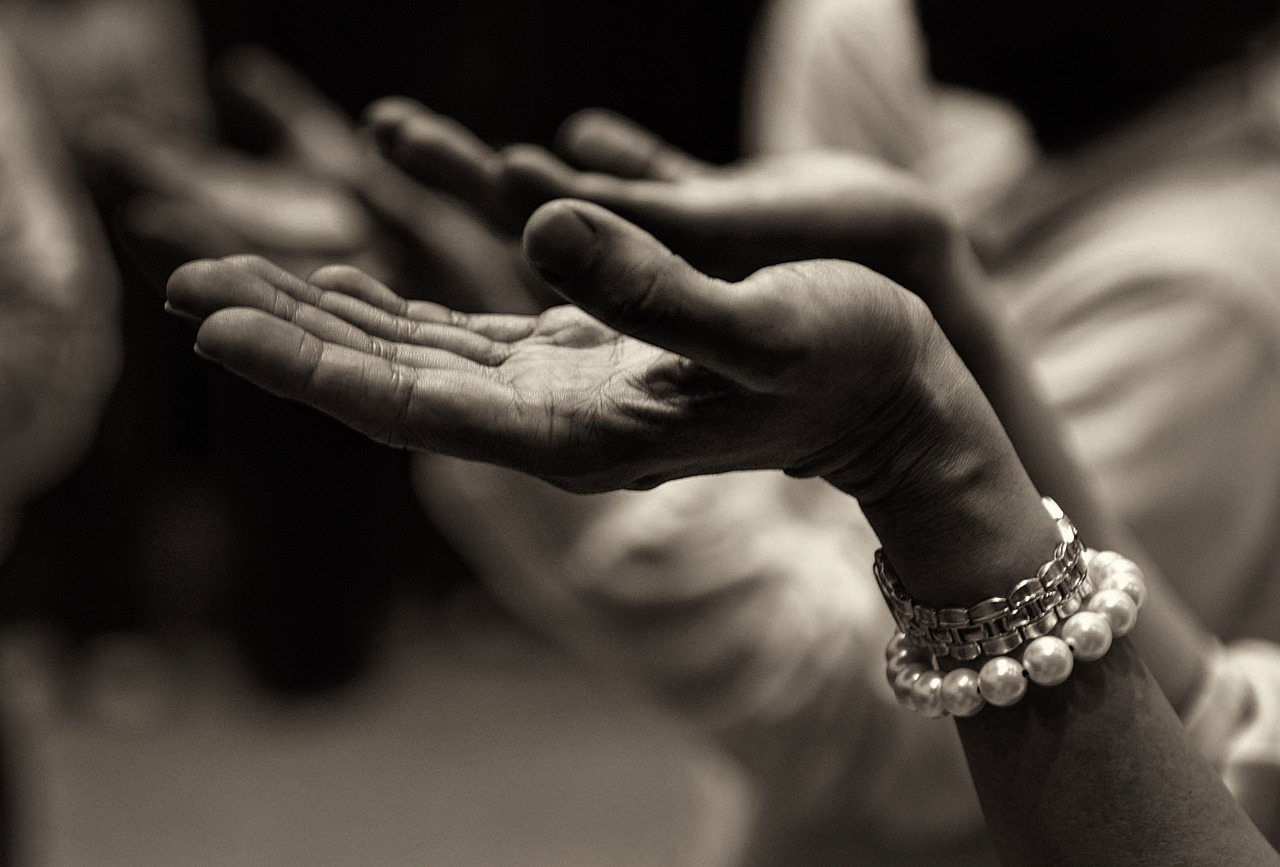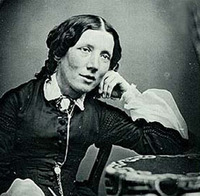
Harriet Beecher Stowe: How To Live on Christ; path2prayer.com
“Hudson Taylor sent out a booklet on how to live on Christ by Harriet Beecher Stowe. No one seemed to know where to locate the booklet. I found the words were an introduction to a book by Christopher Dean.”
These paragraphs come from Harriet Beecher Stowe’s Introduction to Christopher Dean’s Religion as it Should Be, or, The Remarkable Experience and Triumphant Death of Ann Thane Peck. It was published by the Massachusetts Sabbath School Society in 1847.
These sentiments probably also formed the basis of a little booklet authored by Harriet Beecher Stowe, entitled How To Live On Christ, which Hudson Taylor sent to all the missionaries affiliated with the China Inland Mission in 1869. The booklet had been a mystery for many years, because no copies seemed to exist, nor was there a record of such a book at any of the archives of the works of Harriet Beecher Stowe or Hudson Taylor.
How to Live On Christ
– Source: path2prayer.com
The following paragraphs by Harriet Beecher Stowe first appeared as an introduction to a book written by Christopher Dean and published in 1847 [May 12, 1847, p. 75.]. Read more about how the book was eventually located following the introduction below.—Dan
Harriet Beecher Stowe’s Introduction
THE following sketch of one, rendered interesting not only by natural amiableness, but by a singularly early devotion and a premature death, we hope will not be found without its uses, especially among those like her in the morning of life.
To some things in it we would especially direct our readers, as uncommon.
1st. It is the example of one who made it a serious and practical endeavor to do all the good she could.
Many Christians are satisfied if they are doing something —others wish to feel sure that they are doing much; but few admit the obligation, or make serious efforts, to do all they can. Very few seem to have made any practical estimates of what they have to give to Christ, or to be inquiring, with deep solicitude, how it may all be employed in his service.
2nd. The motive in her case, seems not to have been conscience, nor a sense of obligation working with a powerful and wearying force, but love.
It is this that gives the impulsive, free, and beautiful character to all her efforts. Why, at the age of fourteen, did she go from dwelling to dwelling, urging with childlike simplicity the tender love of Christ; comforting the sick, and praying with the dying?
Not because she felt it to be her duty and dared not to do otherwise, but because, full of love to our unseen Saviour, and of pity for those who neglected him, she, like his apostles, ‘could not but speak the things she had seen and heard;’ and so far from regarding it as a wearisome effort to perform these offices, it would have been a more difficult task for her to refrain from them.
This explains the reason, why, though she was diffident and retiring, it seemed to her not an obligation, but a privilege, to pour forth her soul in prayer at the social altar. So full of gratitude, devotion, and love was she always, that prayer was to her sweet necessity, a rest, a relief. Hence the frequency of her seasons of prayer, and her artless declaration, that she ‘could not help praying oftener.’
These remarks may assist those, who, conscientiously attempting the duties of religion, find them so often a hard and painful endeavor, and who progress by a constant and desperate struggle. How is all to be made easy?—to follow forth spontaneously and delightfully?
Christ certainly had some meaning when he said, ‘Learn of me and ye shall find rest;’—he meant just what he declared, when he said, ‘my yoke is easy and my burden is light;’ and they who do not find them easy and light, may be persuaded that they are not following the practice of religion in Christ’s way, but in some colder and more difficult mode of their own.
They may be Christians, and their sad and disheartened endeavors may be very precious in the eyes of Him who will not break even a bruised reed; but while their whole life is a constant conflict of a sense of obligation and duty with an ever rebellious heart, they may be persuaded that they do not yet understand the terms on which their Saviour would have them live with him; nor the perfect ‘freedom of the sons of God.’
There is such a way of living with, or in Christ, that watchfulness, prayer, devotion, patience, gentleness, meekness, become so many sweet and spontaneous impulses, instead of labored acquisitions, alternately the subjects of hope and of despair; and this is true freedom.
Many Christians are satisfied
if they are doing something
—others wish to feel sure
that they are doing much;
but few admit the obligation,
or make serious efforts,
to do all they can.
How To Live On Christ Booklet Beginning
This is where the booklet began. In the Oberlin Evangelist it is entitled, “The Way to Live On Christ.” (May 12, 1847, p. 75.
 The very figure which Christ uses illustrates this idea; ‘as the branch cannot bear fruit of itself, except it abide in the vine, no more can ye, except ye abide in me.’
The very figure which Christ uses illustrates this idea; ‘as the branch cannot bear fruit of itself, except it abide in the vine, no more can ye, except ye abide in me.’
Now how does a branch bear fruit? Not by incessant effort for sunshine and air; not by vain struggles for those vivifying influences which give beauty to the blossom, and verdure to the leaf;—it simply abides in the vine, in silent and undisturbed union; and the fruit and blossoms appear as of spontaneous growth.
How, then, shall a Christian bear fruit? By efforts and struggles to obtain that which is freely given; by meditations on watchfulness, on prayer, on action, on temptation, and on dangers? No, there must be a full concentration of the thoughts and affections on Christ; a complete surrender of the whole being to him; a constant looking to him for grace.
Christians in whom these dispositions are once firmly fixed, go on calmly as the sleeping infant borne in the arms of its mother. Christ reminds them of every duty in its time and place—reproves them for every error—counsels them in every difficulty, excites them to every needful activity.
In spiritual, as in temporal matters, they take no thought for the morrow—for they know that Christ will be as accessible tomorrow as to-day, and that time imposes no barrier on his love. Their hope and trust rest solely on what he is willing and able to do for them; on nothing that they suppose themselves able and willing to do for him.
Their talisman for every temptation and sorrow, is their oft repeated, childlike surrender of their whole being to him; as the infant in every trouble, finds a safe asylum in the bosom of its mother. That such was the course of the subject of this narrative is shown by her great and uncommon activity in every good thing; for, we read,
‘He that abideth in me
and I in him,
the same bringeth forth much fruit;
for without me ye can do nothing.’
Some may say, ‘Truly this is a very delightful state of feeling, but how shall we obtain it? How shall we begin?’
We answer, just in the same way that a sinner begins the Christian life, by coming to the Saviour, and making a full, free and hearty surrender of his body, soul and spirit; fully resolved in future to resign the whole to the Redeemer’s direction. And having made this general surrender, make it also in particular, in reference to every circumstance of every day.
 Let us imagine a day spent on this principle. You awake in the morning and commend yourself to Christ’s care for the day.
Let us imagine a day spent on this principle. You awake in the morning and commend yourself to Christ’s care for the day.
The first temptation that besets you may lead you to a waste of time. Say immediately, ‘Lord, assist me in this particular.’
The next may be a temptation to irritation. Cast yourself again on Christ for this. A few hours after you may be tempted to censorious remarks on some neighbor. Cast yourself upon Jesus. A while after, you may perhaps forget yourself and give utterance to some hasty or ill-judged expression.
Turn instantly to Christ, confess your fault, and ask for further help. If you find yourself beset with uncommon difficulties and temptations, and in danger of forgetting what manner of spirit you are of,—steal from your avocations though but for a few moments, and ask help of Jesus.
The example of the subject of this memoir, in having a full and stated season of prayer at noon, cannot be too highly commended. The middle is usually the most unspiritual part of the whole day.
The cool of the morning is generally to every one a time of good purpose and resolution, and the quiet of the evening is often devoted to penitence and retrospection; but the noon is too often a season of hurry and bustle—there is therefore so much the greater need that we then consecrate a portion of the time as a stated season of prayer.
But the Christian, who would live as Christ directs, must beware of making seasons of prayer the substitute for that constant recurrence to him which we have endeavored to inculcate. Morning and evening the little child is with its mother in a long and fond embrace; it listens with rapture to the expressions of her affection, and willingly renders the tribute of promised obedience. But in times of difficulty or danger, it instinctively runs to the same arms for protection, without reflecting whether the danger be great or small.
A direction of great importance to one who would live this life, is this:—In your sins, troubles, and temptations, make no distinction between great and little things.
Remember that nothing that has the slightest bearing on your improvement and spiritual progress is insignificant in the estimation of Christ. Now it is a fact, that Christians are more impeded in their progress by little things, than by great ones;—because, for great things, they seek the strength of Christ, and for little ones, they act in their own.
But if the little accidents of every day’s occurrence, the petty annoyances to which every one is subjected, be sufficient to ruffle the temper and excite an unchristian spirit, they are to you matters of very serious moment; and as such, you must regard them—nor can you fully abide in Christ by attaching to such things that just importance, which shall lead you to refer them to Him with the same freedom that you feel in reference to what you commonly call serious affairs.
If you are conscious of peculiar and besetting faults, familiarize your mind to those incidents of the life of Jesus, which show a particular bearing on them.
- If you are irritable, examine all those incidents which show his untiring patience;
- if you are proud, those which exhibit his humility;
- if you are worldly, those that show his spirituality;
- if you are negligent and careless in duty, those which show his incessant zeal and activity.
Study them, understand them, keep them in memory, and pray to him to  infuse into you the same spirit. The memory too may well be stored with those sacred songs descriptive of the character of the Saviour, or imploring his divine aid; for their sweet words will sometimes come to you in hours of temptation like gentle messages from your Lord.
infuse into you the same spirit. The memory too may well be stored with those sacred songs descriptive of the character of the Saviour, or imploring his divine aid; for their sweet words will sometimes come to you in hours of temptation like gentle messages from your Lord.
The remarks now made are intended as general hints; but the only teacher of the true life of faith, is Christ. Go to him and ask him to direct you.
Remember the remarkable dying words of the subject of this memoir, in relation to the Saviour,
‘He came and looked upon me and said, “I am willing to make you just as meek as I am, just as patient, just as lovely. Indeed it seemed as if he had been by me long before, only I had not perceived him.”’
Christ in the Bible says this to every Christian, when he says, ‘I will put my law into their hearts and write it in their thoughts.’ Christ is willing to make you just as meek, just as patient, just as lovely as he is; and if you desire it earnestly, if you desire it more than everything else, if you are willing to give up all beside for it, he will explain to you practically what is meant by ‘abiding in him,’ and by his coming to make his abode with you.
 Then your Christian race will be full of love and joy; more like the free flight of a bird, than the struggles of a captive. You will naturally lay aside every weight, and the sin that easily besets you, and run with patience the race that is set before you, because your whole soul will be so filled with the view of Jesus at its termination; you will be so inspired with admiration, hope and joy, that you will run because you cannot hold back; —the spectators, the race-course, all about you, will be forgotten in the view of Jesus, at once your helper, your judge, and your eternal reward.
Then your Christian race will be full of love and joy; more like the free flight of a bird, than the struggles of a captive. You will naturally lay aside every weight, and the sin that easily besets you, and run with patience the race that is set before you, because your whole soul will be so filled with the view of Jesus at its termination; you will be so inspired with admiration, hope and joy, that you will run because you cannot hold back; —the spectators, the race-course, all about you, will be forgotten in the view of Jesus, at once your helper, your judge, and your eternal reward.
From Harriet Beecher Stowe’s Introduction to Christopher Dean’s Religion as it Should Be, or, The Remarkable Experience and Triumphant Death of Ann Thane Peck
The booklet also appeared in the Oberlin Evangelist
FOR MORE:
Jesus watches over you very carefully

Leave a Reply